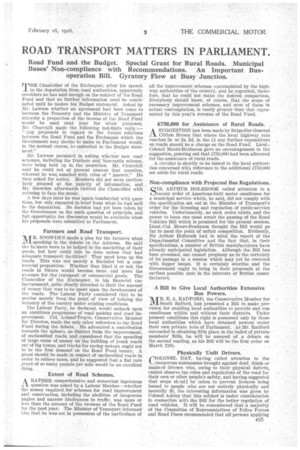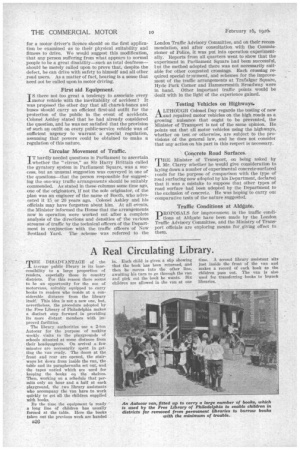ROAD, TRANSPORT MATTERS IN PARLIAMENT.
Page 9

Page 10

If you've noticed an error in this article please click here to report it so we can fix it.
Road Fund and the Budget. Special Grant for Rural Roads. Municipal Buses' Non-compliance with Recommendations. An Important Busoperation Bill. Gyratory Flow at Busy Junction.
THB Chalicenor of the Exchequer, after his speech to the deputation from road authorities, apparently considers he has said enough on the subject of the Road. Fund and that no further information need be vouchsafed until he makes his Budgetstatement. Asked by Mr. Lawson whether an agreement had been come to between the Treasury and the Ministry of Transport whereby a proportion of the income of the Road Fund would be used next year for other purposes,
Mr. Churchill made the following indefinite reply :— _ "Any proposals in regard to the future relations between the Road Fund and the Exchequer which the Government may decide to make to Parliament would, in the normal course, be embodied in the Budget state ment." • Mr. Lawson persisted in asking whether new road
schemes, including the Durham and Newcastle scheme,. were being held up in the meantime. Mr. Churchill said he could not at iresent answer that question, whereat he was...assailed with cries of "Answer." He , then asked for .notice. Members did not seem particularly pleased at the paucity of information, and Mr. Snowden afterwards twitted the Chancellor with
refusing to face the music. . • A few days later he was again bombarded with 'questions, but only, repeated in brief form what he had said to the deputation. No decision had yet been taken by the 'Government on the main question of principle, and full opportunity for discussion would be available when his proposals were submitted to Parliament.
Farmers and Road Transport.
mR. SNOWDEN made a plea for the farmers when speaking in the debate on the Address. He said the faernere were to be helped in the marketing of their goods, but how could this be done unless they had adequate transport facilities? They must keep up the roads. This was not merely a Socialist but a comrpereial proposition. Whether they liked it or not, the roads in future would become more and more the avenues for the transport of commercial goods. The Chancellor of the Exchequer, in hie financial cm
. barrassnient, quite clearly intended to limit the amount or money that was to be spent upon the development of the roads. The Labour Party considered that to be unwise!' merely from the point of view of helping the industry of the country Under existing conditions.
• The Labour Party, he declared, would embark upon
. an ambitious programme of road making and road improvement. Col. Acland-Troyte, Conservative Member for Tiverton, made the only other reference to the Road Fund during the debate. He advocated a contribution towards the upkeen, as distinct frail the improvement, of unclassified roads, and considered that the spending of large sums of money on the building of strunk roads out of big towns, and tracks for racing motors, ought net to be the first demand an the Road Fund money. A grant should be made in respect of unclassified roads In order to relieve-rates; and he suggested that a flat rate grant of so many pounds per mile would lie an excellent thing.
. Extent of Road Schemes.
A RATHER comprehensive and somewhat ingenuous _L-1. question Was asked by a Labour Member—whether the money required„ for schemes for road improvement and construction, including the abolition of dangerous angles and narrow hindrances to traffic, was more or less than the amount of the revenue of the Road Fund
• for the past year. The Minister of Transport informed him that he was not in possession of the particulars of all the improvement schemes contemplated by the highway authorities of the country. and he regretted, therefore, that he could not make the desired comparison. Everybody should know, of course, that the scope of necessary improvement schemes, and even of those in actual contemplation, is vastly greater than that represented by this year's revenue of the Road Fund.
£750,000 for Assistance of Rural Roads. .
A SUGGESTION has been made by Brigadier-General Clifton ,Brown that where the local highway rate
reaches 2s or 2s. 3d. in the any further expenditure on roads should be a charge on the Road Fund. Lieut.Colonel Moote-Brabazon gave no encouragement to the suggestion, pointing out that 1750,000 had been allocated for the assistance of rural roads.
A circular is shortly to be issued to the local authorities concerned with reference to the additional £750,000 set aside for rural roads.
Non-compliance with Projected Bus Regulations.
SIR ARTHUR HOLBROOK called attention to a recent order of American-built motor omnibuses for a municipal service which, he said, did not comply with the specification set out in the Minister of Transport's order for the licensing and regulation of public-service vehicles. Unfortunately, no such order exists, and the power to issue one must await the passing of the Road Vehicles Bill which is promised for the present session. Lieut.-Col. Moore-Brabazon thought the Bill would go far to meet the point of unfair competition. Evidently, Sir Arthur Holbrook had in mind the report of the Departmental Committee and the fact that, in their specifications, a number of British manufacturers have already anticipated legislation. Although the Bill has been promised, one cannot prophesy as to the certainty of its passage in a session which may yet be crowded with bigger issues. It is certainly overdue and the Government ought to bring in their proposals at the earliest possible date in the interests of British manufacturers.
A Bill to Give Local Authorities Extensive Bus Powers.
Vrit. E. A. RADFORD, the Conservative, Member for _LY1South Salford, has presented a Bill to make provision for enabling local authorities to provide and run omnibuses within and without their districts. Under present conditions this right is possessed only by those local authorities which have obtained powers under their own private Aets of Parliament. As Mr. Radford succeeded in obtaining fifth place in the ballot of, private members' Bills, he will be assured of a debate on the second reading, as his Bill will be the firet order on March 12th.
Physically Unfit Drivers.
COLONEL DAY, having called attention to the numerous summonses brought against deaf, dumb or maimed drivers who, owing to their physical defects,. cannot observe the rules and regulations of the road for their own or other people's safety, and having suggested that steps sheuld be taken to prevent licences being issued to people who are not entirely physically and mentally fit, the interesting information was given by Colonel AShley that this subject is under consideration in connection with the Bill for the better regulation of road vehicles. It will be remembered that a majority of the Committee of Representatives of Police Forces and Road Users recommended that all persons applying
for a motor driver's licence should on the first application be examined as to their physical suitability and fitness to drive. We would suggest this modification, that any person suffering from what appears to normal people to be a great disability—such as total deafness— should be merely called upon to prove that, despite the defect, he can drive with safety to himself and all other road users. As a matter of fact, hearing is a sense that need not be 'called upon in motor driving.
• First aid Equipment.
IS there not too great a tendency to associate every motor vehicle with the inevitability of accident? It was proposed the other day that all chars-h-bancs and buses should carry an efficient first-aid outfit for the protection of the public in the event of accidents. Colonel Ashley stated that he had already considered the question, and he was not satisfied that the provision of such an outfit on every public-service vehicle was of sufficient urgency to warrant a special regulation, assuming that powers could be obtained to make a regulation of this nature.
Circular Movement of Traffic.
IT hardly needed questions in Parliament to ascertain whether the "circus," as Sir Harry Brittain called the gyratory system in Parliament Square, was a success, but an unusual suggestion was conveyed in one of the questions—that the person responsible for suggesting the one-way traffic arrangements should be suitably commended. As stated in these columns some time ago; one of the originators, if not the sole originator, of the plan was an engineer of the name of Booth, who advocated it 15_ or 20 years ago. Colonel Ashley and his officials may have forgotten about him. At all events, the Minister informed the House that the arrangements now in operation were worked out after a complete analysis of the directions and densities of' the various streams of traffic by the technical officers of the Department in conjunction with the traffic officers of New Scotland Yard. The scheme was referred to the
London Traffic Advisory Committee, and on their recommendation, and after consultation with the Commissioner of Police, it was put into operation experimentally. Reports from all quarters went to show that the experiment in Parliament Square had been successful, I ut the method adopted there was not necessarily suitable for other congested crossings. Each crossing required special treatment, and schemes for the improvement of the traffic arrangements at Trafalgar Square, Hyde Park Corner and Hammersmith Broadway were in hand. Other important traffic points would be dealt with in the light of the experience gained.
Testing Vehicles on Highways.
A LTHOUGH Colonel Day regards the testing of new kland repaired motor vehicles on the high roads as a growing nuisance that ought to be prevented, the Minister of Transport is not of the same opinion. He points out that all motor vehicles using the highways, whether on test or otherwise, are subject to the provisions of the general law, and he does not consider that any action on his part in this respect is necessary.
Concrete Road Surfaces.
THE Minister of Transport, on being asked by _I._ Mr. Clarry whether he would give consideration to laying down a number of experimental concrete-surfaced roads for the purpose of comparison with the type of road surfacing now adopted by his Department, declared that it was a mistake to suppose that other types of road surface had been adopted by the Department to the exclusion of concrete. He was hoping to carry out comparative tests of the nature suggested.
Traffic Conditions at Aldgate.
TIDROPOS.ALS for improvement in the traffic condi"tions at Aldgate have been made by the London Traffic Advisory Committee, and the Ministry of Transport officials are exploring means for giving effect to them.
































